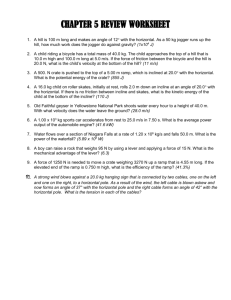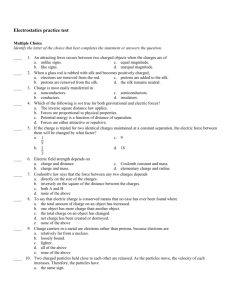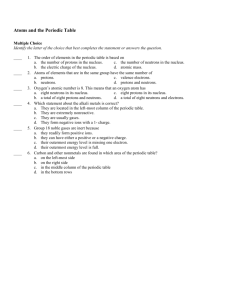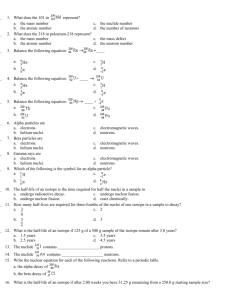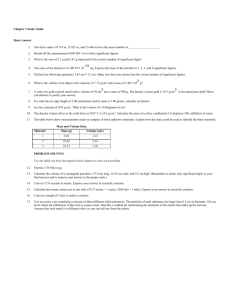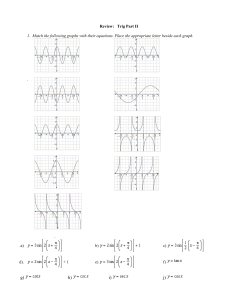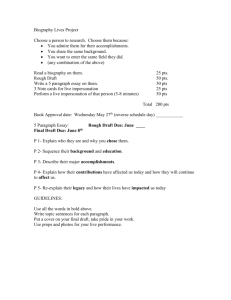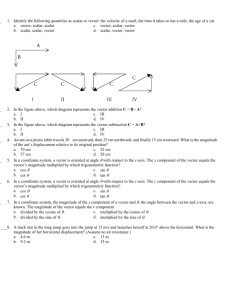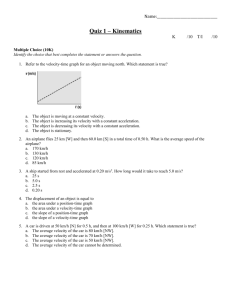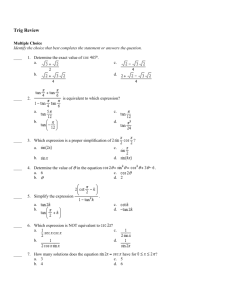WandLunit one test study guide.doc
advertisement
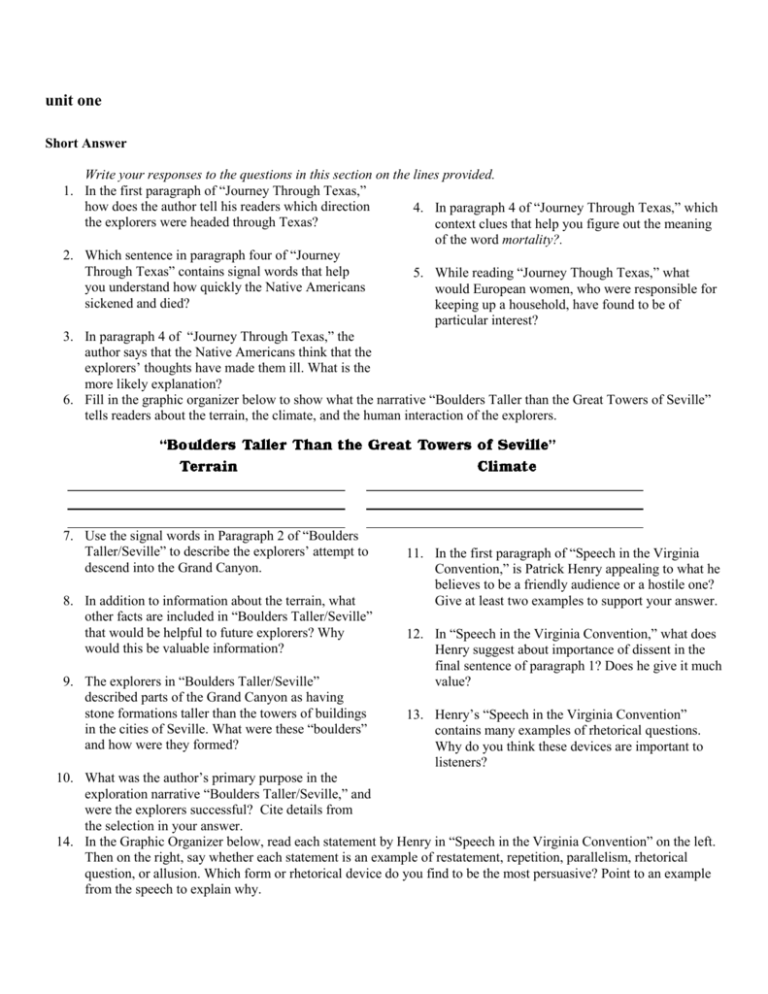
unit one Short Answer Write your responses to the questions in this section on the lines provided. 1. In the first paragraph of “Journey Through Texas,” how does the author tell his readers which direction 4. In paragraph 4 of “Journey Through Texas,” which the explorers were headed through Texas? context clues that help you figure out the meaning of the word mortality?. 2. Which sentence in paragraph four of “Journey Through Texas” contains signal words that help 5. While reading “Journey Though Texas,” what you understand how quickly the Native Americans would European women, who were responsible for sickened and died? keeping up a household, have found to be of particular interest? 3. In paragraph 4 of “Journey Through Texas,” the author says that the Native Americans think that the explorers’ thoughts have made them ill. What is the more likely explanation? 6. Fill in the graphic organizer below to show what the narrative “Boulders Taller than the Great Towers of Seville” tells readers about the terrain, the climate, and the human interaction of the explorers. 7. Use the signal words in Paragraph 2 of “Boulders Taller/Seville” to describe the explorers’ attempt to descend into the Grand Canyon. 8. In addition to information about the terrain, what other facts are included in “Boulders Taller/Seville” that would be helpful to future explorers? Why would this be valuable information? 9. The explorers in “Boulders Taller/Seville” described parts of the Grand Canyon as having stone formations taller than the towers of buildings in the cities of Seville. What were these “boulders” and how were they formed? 11. In the first paragraph of “Speech in the Virginia Convention,” is Patrick Henry appealing to what he believes to be a friendly audience or a hostile one? Give at least two examples to support your answer. 12. In “Speech in the Virginia Convention,” what does Henry suggest about importance of dissent in the final sentence of paragraph 1? Does he give it much value? 13. Henry’s “Speech in the Virginia Convention” contains many examples of rhetorical questions. Why do you think these devices are important to listeners? 10. What was the author’s primary purpose in the exploration narrative “Boulders Taller/Seville,” and were the explorers successful? Cite details from the selection in your answer. 14. In the Graphic Organizer below, read each statement by Henry in “Speech in the Virginia Convention” on the left. Then on the right, say whether each statement is an example of restatement, repetition, parallelism, rhetorical question, or allusion. Which form or rhetorical device do you find to be the most persuasive? Point to an example from the speech to explain why. 15. Reread the third paragraph of “Speech in the Virginia Convention” and find the underlined word insidious. What other words or phrases in the paragraph provide context clues to the meaning of insidious? 16. In the first paragraph of “Speech in the Convention,” how does Franklin compare men and different religions? 17. Benjamin Franklin begins his “Speech in the Convention” by humbly describing his own faults. Interpret how Franklin hoped this might sway his audience. What reaction might he have hoped for? 18. In “Speech to the Convention,” Franklin admits that there may still be differences among the delegates about the perfection of the Constitution. He urges them to sign it anyway, for a particular reason. Explain his reasoning. 19. In “Speech in the Convention” what rhetorical device does Franklin use in this passage “... you inevitably assemble with those men all their prejudices, their passions, their errors of opinion, their local interests ...”? 20. Does Franklin’s “Speech in the Convention” appear to be directed toward an audience well disposed or poorly disposed to the Constitution? Why do you think as you do? 21. In paragraph one from Of Plymouth Plantation, the sailors work to deal with the peril of storms and threats to the ship. What were they hoping for that means the opposite of peril? 22. Reread the sentence beginning “And truly there was great distraction and difference of opinion. . .” in the first paragraph of Of Plymouth Plantation. What is the difference of opinion, or conflict, among the sailors in this sentence? 23. Reread paragraph 4 in Of Plymouth Plantation, which begins “Being thus arrived. . .”. What is Bradford’s religious purpose in writing this paragraph? 24. Reread the section beginning “Besides, what could they see but a hideous and desolate wilderness. . .” through the end of the section from Chapter 9 of Of Plymouth Plantation. To whom is Bradford addressing his words and what is his purpose in writing this section? 25. Break down the passage from Of Plymouth Plantation in this Graphic Organizer. As you break it down, fill in the Who, What, and Why boxes. Then fill in the Main Idea box. 26. Reread the second paragraph under Book 2 of Of Plymouth Plantation. What message is Bradford giving to his audience about the presence of God in the midst of sickness and death? 27. Reread the sentence beginning “But now amongst his company there was far another kind of carriage . . .” in Of Plymouth Plantation. Identify who is being described in this passage. Then describe the attitude of these people to their companions when everyone is healthy and the attitude of these people to their companions when illness strikes. 28. The final paragraph in the selection from Of Plymouth Plantation tells you that there was no want in the summer months, because the company fished, hunted, and grew corn. Elsewhere, Bradford says that they learned these things from Squanto. What would have been his purpose for writing this information in his narrative? 30. The final sentence from Of Plymouth Plantation reads: “Which made many [Pilgrims] afterwards write so largely of their plenty here to their friends in England, which were not feigned, but true reports. The phrase “not feigned but true” suggests that the word feigned means the opposite of true. What other words could you use in place of feigned? 31. What are some examples from the first paragraph in the sermon Sinners in the Hands of an Angry God that tell you that a sermon is a kind of religious writing? 32. What context clues do you see in the first sentence of paragraph 3 of Sinners in the Hands of an Angry God that help you determine the meaning of the word gulf in the same sentence? 33. In the second part of the third paragraph of Sinners 29. Read statements 1 and 2 in Of Plymouth Plantation in the Hands of an Angry God, what metaphors of the peace agreement between Bradford’s does Edwards use for human beings and for God’s company and Massasoit. Do these statements wrath in the face of human beings’ wickedness? describe a mutual situation? Why or why not? 34. Use the Graphic Organizer below to find context clues to the meaning of the word waxing in paragraph 4 of Sinners in the Hands of an Angry God. The word waxing is in the top box. In the second box, write at least two context clues from the sentence that hint at the meaning of waxing. Finally, in the third box, write your definition of the word waxing. 35. What does Edwards mean in paragraph 5 of Sinners in the Hands of an Angry God when he refers to the members of his congregation as “dead in sin”? 36. In the fifth paragraph of Sinners in the Hands of an Angry God, Edwards lists several ways in which members of his congregation may have become better people and more religious people. Based on the rest of the paragraph, why would these statements probably not be comforting to his listeners? 37. In paragraph 8 of Sinners in the Hands of an Angry God, how does Edwards characterize the individuals in his congregation? What word does he repeat several times in order to persuade his listeners of God’s feeling toward them? 42. What elements of Franklin’s The Autobiography help you identify it as an example of the autobiography genre? 43. What does Franklin mean in The Autobiography when he says his plan was “to acquire the habitude of these virtues?” 44. In The Autobiography, what does Franklin say he hoped might be the effect of his success in acquiring some of the virtues? How would this success help him? 45. In The Autobiography, which virtues did Franklin expect would result in a more secure financial footing for him? 38. Reread the paragraph toward the end of Sinners in the Hands of an Angry God which begins “And now you have an extraordinary opportunity . . . “ What effect do you think this change in approach had on Edwards’ congregation? 46. In the first paragraph following Franklin’s daily schedule in The Autobiography, Franklin comes to a conclusion. What does he learn and admit that tells he is more honest about himself than many writers? 39. To which emotion in his congregation does Edwards appeal to most in his sermon Sinners in the Hands of an Angry God? 47. In The Autobiography, which virtue does Franklin feel he has most failed to achieve? What two major reasons does he give for this failure? 40. What synonym for the word dolorous can you find in paragraph 10 of Sinners in the Hands of an Angry God? What other synonym can you also suggest for dolorous that is not in the paragraph? 48. In Poor Richard’s Almanack, what does Franklin mean by the aphorism “Three may keep a secret if two of them are dead”? Is this a serious or humorous aphorism? Why? 41. In the first paragraph of The Autobiography, Franklin says he “conceived the bold and arduous project of arriving at moral perfection.” Locate the word in a nearby sentence that gives a context clue to arduous and provide your own synonym. 49. Note the aphorism from Poor Richard’s Almanack in the first column and write its meaning in the second column. 50. Why might this aphorism from Poor Richard’s Almanack --“Tis easier to prevent bad habits than to 51. How does Jefferson use the language of reason in break them” -- have had special meaning to the first paragraph of the The Declaration of Franklin? Independence? 52. In The Declaration of Independence, Jefferson lists many English abuses of the colonists. Among these abuses is a long list of military actions that he believes are unwarranted. Fill in the two charts below as follows: Chart 1: List five military abuses; Chart 2: List impacts of military abuses on the colonists. 53. Toward the end of The Declaration of Independence is a short paragraph that begins “A prince whose character . . .” Who is the person Jefferson is describing and what loaded words does he use to describe him? 54. Read the third to last paragraph of The Declaration of Independence and find the word consanguinity. Cite context clues in the paragraph that help you figure out the meaning of consanguinity. 55. How might you have responded to The Declaration of Independence if you were a Native American living at the time? 56. In the first paragraph of The Crisis, the author says “The summer soldier and the sunshine patriot will in the crisis, shrink from the service of his country.” About whom is the author talking? 57. How does Paine use charged and loaded words in paragraph two of The Crisis to show readers what he thinks of the King of England? 58. What kind of printing elements does Paine use in The Crisis to emphasize his ideas and add to their persuasive power? 59. Read the two direct quotations in paragraph three of The Crisis. What does Paine suggest is the difference between the first speaker and the second speaker in terms of their commitment to peace and independence? 60. Paine issues a call to action to the American colonists in the final paragraph of The Crisis. In what ways is the first part of the paragraph like a school pep rally before an important sports event? Which elements are similar? Essay Write an extended response to the question of your choice or to the question or questions your teacher assigns you. 61. In both “Journey Through Texas” and “Boulders 65. Choose either Henry’s “Speech in the Virginia Taller/Seville” the authors describe their Convention” or Franklin’s “Speech in the experiences most often in terms of the number of Convention” and write a brief essay about the days required to accomplish a task. They rarely use problems each writer sees. Focus on the problems time references such as week, months, etc. Write a with their other countrymen and their potential brief essay to explain why you think the day was an unwillingness to work together as a new nation. important time frame for the explorers and for the Use details from either speech, if you wish, to Native Americans support your points. 62. Thinking About the Essential Question: Choose either “Journey through Texas” or “Boulders Taller/Seville” and write a brief essay to describe the attitudes the Spanish explorers had toward the Native Americans they encountered. How did these attitudes affect the way the explorers treated the Native Americans? 63. Imagine you are a European reading one of these selections after the explorers have returned to Spain. Choose either “Journey through Texas” or “Boulders Taller/Seville” and write a brief essay comparing the positive and negative things about each place explored in one of the selections. 64. Choose either “Journey Through Texas” or “Boulders Taller/Seville” and write a brief essay about why you would or would not have wanted to be a part of the exploration described. 66. Choose one of the following: “Speech in the Virginia Convention” is the source of Patrick Henry’s famous quote, “give me liberty or give me death!” Write a brief essay on what this quotation means and how it might be used by people either today or in other periods of history. “Speech in the Convention” is the source of Benjamin Franklin’s quote, “The opinions I have had of its (the Constitution’s) errors I sacrifice to the public good. I have never whispered a syllable of them abroad. Within these walls they were born, and here they shall die.” Write a brief essay on the message you think Franklin was communicating to the delegates and whether you think this passage has any relevance to politics today. 67. Choose one of the following: Patrick Henry counsels absolute honesty from himself and from others in “Speech in the Virginia Convention.” Write a brief essay to describe the value and/or the danger of such a position. In “Speech in the Convention,” Benjamin Franklin counsels support for the Constitution both from himself and from his listeners. He counsels his listeners to keep their criticisms to themselves, as he plans to do. Write a brief essay to describe the value of and/or the danger of such an approach 68. Thinking about the Essential Question: How did writers affect American society? Both “Speech in the Virginia Convention,” and “Speech in the Convention” led to great changes in American society. Choose either Henry’s or Franklin’s speech and write a brief essay about what change the speech inspired and what part you think the speech might have played in achieving this change. 69. In a brief essay, describe why agreements 3 and 4 are the most fair and just of the six agreements reached by the Native Americans and the Pilgrims in Of Plymouth Plantation. 70. Write a short essay to explain the meaning of this complex sentence taken from Of Plymouth Plantation. It follows a passage in which Bradford describes the many people who fell ill and died from disease. Analyze the sentence by breaking it into smaller parts and find the main idea and supporting details. And of these in the time of most distress, there was but six or seven sound persons who to their great commendations, be it spoken, spared no pains night or day, but with abundance of toil and hazard of their own health, fetched them wood, made them fires, dressed them meat, made their beds, washed their loathsome clothes, clothed and unclothed them; . . . 71. What overall message to you think Bradford means to communicate in Of Plymouth Plantation? Write a brief essay to state what you think and speculate how this message might have meaning for people today? 72. Thinking About the Essential Question: What is the connection between literature and the American character? Write a brief essay to describe the characteristics identified in Of Plymouth Plantation which Bradford thinks are important for English colonists coming to the new land. Give examples from the selection. How might this narrative have affected people as they read it while living in England. 73. Sinners in the Hands of an Angry God changes in tone on the last page, as Edwards switches to a different mood and uses different arguments. In a brief essay, identify the change, using details from the text. In addition, explain why Edwards may have chosen to change the delivery style of his sermon. 74. In a brief essay, choose details from Sinners in the Hands of an Angry God that describe what Edwards says could happen to those who did not heed his sermon. Include the impression that these words may have made on Edwards’ congregation. 75. Edwards uses metaphors and imaginative expressions of speech to dramatize Sinners in the Hands of an Angry God. Select at least two from the first paragraph. In a short essay, explain why they are powerful and what effect they might have on listeners. 76. Thinking About the Essential Question: What is the relationship between the writer and society? Write a brief essay about the effect a person such as Edwards, in his sermon Sinners in the Hands of an Angry God, would have had on a tightly knit community in which almost everyone attended the same church. 77. Choose one of the following: In The Autobiography, Franklin uses an analogy about a “speckled ax.” Write a brief essay to explain the analogy and how it relates to Franklin’s attempts at self-improvement. In Poor Richard’s Almanack, one of the aphorisms is “Love your neighbor; yet don’t pull down your hedge.” Write a brief essay to give your opinion about whether this aphorism makes sense or whether it seems to contradict itself. 78. Choose one of the following: In The Autobiography, Franklin makes a comparison between weeding a garden and improving oneself. In a brief essay, extend this comparison by using details from the autobiography. 81. Choose The Declaration of Independence or The Crisis. Write a brief essay to identify the persuasive technique upon which the author bases his writing. Does he use emotion or reason? Give examples for whichever selection you choose. In Poor Richard’s Almanack, compare these two aphorisms: “A small leak will sink a great ship.” “For want of a nail the shoe is lost; for want of a shoe, the horse is lost; for want of a horse the rider is lost.” Do these two aphorisms communicate similar ideas, or are they different? Write a brief essay to explain your answer. 82. Choose either The Declaration of Independence or The Crisis and write a brief essay to describe how the author lays out his arguments that the English king is not to be trusted and that he has betrayed the colonists’ trust. 79. Choose either The Autobiography or Poor Richard’s Almanack and write a brief essay to describe what the selection tells you about the character of Benjamin Franklin. Use examples from the selections to justify your choice of characterizations. 80. Thinking About the Essential Question: How does Benjamin Franklin’s work reflect American identity? Think of the values Franklin expresses in The Autobiography and Poor Richard’s Almanack. What do they show about the nature of American identity at the time Franklin was writing? What definition of “success” do you think Americans had at this time? Write a brief essay to address these issues. Oral Response 85. Go back to question 1, 4, 6, or 8 or to the question your teacher assigns to you. Take a few minutes to expand your answer and prepare an oral response. Find additional details in either “Speech to the Virginia Convention” or “Speech in the Convention” that will support your points. If necessary, make notes to guide your response. 86. Go back to question 1, 2, 4, or 7 or to the question your teacher assigns to you. Take a few minutes to expand your answer and prepare an oral response. Find additional details in The Autobiography or Poor Richard’s Almanack that will support your points. If necessary, make notes to guide your response. Other Oral Response 83. Thinking about the Essential Question: What is the relationship between the writer and society? Choose one of the selections and write a brief essay about how the author characterizes the idea of independence for the American colonies. If you choose Jefferson, focus on paragraph two through the words “safety and happiness.” If you choose Paine, focus on the middle of paragraph two, “Not a place on earth. . . “ through the end of the paragraph. 84. Choose either The Declaration of Independence or The Crisis and interpret one of these quotations in terms of its persuasive content: Jefferson: the final paragraph; Paine: Paragraph one, from “Tyranny, like hell, is not easily conquered. . .” through “’tis dearness only that gives everything its value.” 87. Go back to question 2, 9, 10 or to the questions your teacher assigns to you. Take a few minutes to expand your answer and prepare an oral response. Find additional details in The Declaration of Independence or The Crisis that will support your points. If necessary, make notes to guide your response. 88. Go back to question 4, 5, 6, or to the question your teacher assigns to you. Take a few minutes to expand your answer and prepare an oral response. Find additional details in “A Journey Through Texas” or “Boulders Taller/Seville” that will support your points. If necessary, make notes to guide your response. 89. Go back to questions 3, 4, 7, or to the question your teacher assigns to you. Take a few minutes to expand your answer and prepare an oral response. Find additional details in Of Plymouth Plantation that will support your points. If necessary, make notes to guide your response. 90. Go back to questions 3, 6, 8, or to the question your teacher assigns to you. Take a few minutes to expand your answers and prepare an oral response. Find additional details in the selection that will support your points. If necessary, take notes to guide your response. unit one Answer Section SHORT ANSWER 1. ANS: The phrase “We told these people our route was toward sunset,” indicates that the explorers were traveling west. PTS: 1 DIF: Easy OBJ: Interpretation 2. ANS: “On that same day many fell sick, and on the next day eight of them died.” PTS: 1 DIF: Average OBJ: Reading: Recognize Signal Words 3. ANS: The explorers have exposed the Native Americans to a disease from Europe, to which the Spanish are immune. The Native Americans are not immune, and they sicken and die. PTS: 1 DIF: Challenging OBJ: Interpretation 4. ANS: “died,” “the mere sight of us would kill them,” “they were convinced we killed them by merely thinking of it,” “death,” “would die.” PTS: 1 DIF: Easy OBJ: Vocabulary 5. ANS: Women readers would have been interested in the varieties of food available and the ways the Native Americans cooked their food. PTS: 1 DIF: Average OBJ: Narrative Account: Exploration 6. ANS: Terrain: canyons; deep gorge, impossible to descend; river far below canyon walls; high land; Climate: cold and dry; Interactions with Others: found Native Americans friendly and knowledgeable about the land, gained information about distances and other peoples, gained knowledge of how to store and carry water. PTS: 1 DIF: Average OBJ: Narrative Account: Exploration 7. ANS: The men spent three days looking for a way down. On the fourth day, they began a descent, but went only a third of the way down before they returned at 4 p.m.in the afternoon. PTS: 1 DIF: Average OBJ: Reading: Recognize Signal Words 8. ANS: The author describes how the Native Americans store water for long journeys in a land with few water resources and little rain. This is important survival information for anyone traveling in such terrain. PTS: 1 DIF: Easy OBJ: Interpretation 9. ANS: The “boulders” were giant rock formations that had eroded over time into tall tower-like structures. PTS: 1 DIF: Average OBJ: Interpretation 10. ANS: The explorers were to search for a large river, go down the river, and to look for people with large bodies. According to the narrative, they found the large river, and the Grand Canyon, but were unable to descend the canyon to the river and so were not able to follow it downstream. They went the rest of the way on foot, and found only Native Americans who looked much like those they had already met. No, they were not successful. PTS: 1 DIF: Challenging OBJ: Literary Analysis: Narrative Account: Exploration 11. ANS: Sample answer: Henry sees his audience as at least partly hostile. Examples: “But different men often see the same subject in different lights . . . , ” “I hope I may not be thought disrespectful . . . ,” and “Should I keep back my opinions at such a time . . . I should consider myself as guilty of treason toward my country, . . .” PTS: 1 DIF: Average OBJ: Reading: Critique Appeal to Audiences 12. ANS: He gives dissent a very high value when he says that to keep back an opinion is an act of treason against both nation and God. PTS: 1 DIF: Challenging OBJ: Interpretation 13. ANS: Each question makes listeners wait to see if it will be answered and motivates them to consider how they would answer the question themselves. PTS: 1 DIF: Easy 14. ANS: [Column 2 of chart] [Row 1]repetition [Row 2]rhetorical question [Row 3]restatement OBJ: Literary Analysis: Rhetorical Devices Students’ answers about the most persuasive rhetorical device will vary, but should be supported with an example from the text. PTS: 1 DIF: Challenging OBJ: Literary Analysis: Rhetorical Devices 15. ANS: “Trust it not, sir;” “snare to your feet,” “betrayed” PTS: 1 DIF: Average OBJ: Vocabulary 16. ANS: He says that both people and religious sects believe they are in possession of the truth and that anyone who has different ideas is in error. PTS: 1 DIF: Average OBJ: Interpretation 17. ANS: Since Franklin is held in such high regard and is admitting his flaws, he hopes that his humility will cause others to reexamine their views and become less rigid in their opposition to the Constitution. PTS: 1 DIF: Average OBJ: Interpretation 18. ANS: Sample answer: He recognizes that the delegates need to present a united front to the public, both in America and abroad. PTS: 1 19. ANS: Repetition DIF: Challenging OBJ: Interpretation PTS: 1 DIF: Easy OBJ: Literary Analysis: Rhetorical Devices 20. ANS: Sample answer: Students may suggest that Franklin is talking to an audience that needs to be convinced. Therefore, he admits his own doubts, he talks about the error of thinking oneself infallible, and he acknowledges the errors of the document. Then he argues that in spite of this, the unanimity of the colonists is of prime importance PTS: 1 DIF: Average OBJ: Reading: Critique Appeal to Audiences 21. ANS: They were looking for a way to avoid or escape the storms and other threats. They were looking for safety. PTS: 1 DIF: Easy OBJ: Vocabulary 22. ANS: The sailors are conflicted between wanting to earn a living (wages) but not wanting a great risk to their safety and lives (hazard their lives). PTS: 1 DIF: Average OBJ: Interpretation 23. ANS: He is communicating the message that it was God who protected him and his company as they sailed to Plymouth, and that the company blessed God as they came ashore. His intention is to persuade potential new colonists in England to come to Plymouth, and to strengthen their faith in God that he will protect them, too. PTS: 1 DIF: Average OBJ: Literary Analysis: Author's Purpose and Audience 24. ANS: He is addressing the children of the original Plymouth company. He is imagining them saying that they acknowledge that it was God who protected their fathers, the original Pilgrims, and that their fathers praised God for their safety in the new world. Bradford hopes this will persuade his audience to place their faith in God, which has been waning. PTS: 1 DIF: Challenging OBJ: Literary Analysis: Author's Purpose and Audience 25. ANS: Who: Half the Plymouth company What: Died in three months’ time Why: Scurvy, other diseases, cold, weakness Central Point: Because of the long voyage and their weakened condition, half the Plymouth company died in the three winter months of cold, scurvy, and other diseases. PTS: 1 DIF: Challenging OBJ: Reading: Breaking Down Sentences 26. ANS: When many in the company fell sick, according to Bradford, those who tended them were protected by God from falling sick themselves. And for those who helped persons in need, Bradford believes that God will repay them. PTS: 1 27. ANS: DIF: Easy OBJ: Literary Analysis: Author's Purpose and Audience Bradford describes passengers on the ship. He says that these passengers, who drink and have fun with one another while everyone is healthy, act differently when their companions fall ill. They are not willing to help their fellow passengers and do not want to risk getting sick themselves. PTS: 1 DIF: Average OBJ: Interpretation 28. ANS: Bradford was writing to those whom he hoped would come after the initial company. He wanted to reassure them that they would find friendly people already living in the new land who would help them. PTS: 1 DIF: Easy OBJ: Literary Analysis: Author's Purpose and Audience 29. ANS: The statements do not describe a mutual situation. They describe what the responsibilities of the Indians shall be toward the Pilgrims, but do not say what responsibilities of the Pilgrims shall be toward the Indians. PTS: 1 DIF: Average OBJ: Interpretation 30. ANS: Sample answers: false, made up, lies, falsehoods PTS: 1 DIF: Average OBJ: Vocabulary 31. ANS: The writer makes several references to God, Christ, and Hell, and warns his listeners that only God’s hand keeps them from falling into Hell. PTS: 1 DIF: Easy OBJ: Literary Analysis: Sermon 32. ANS: The context clues sink, descend, plunge, and bottomless are all context clues to the meaning of the word gulf, a “deep abyss.” PTS: 1 DIF: Easy OBJ: Reading: Context Clues 33. ANS: He compares humans to the lightweight chaff of wheat after the summer’s harvest, which is easily scattered to the four winds. He compares God’s wrath to the fury of a storm full of thunder and furious whirlwinds. PTS: 1 34. ANS: Middle Box increasing rising DIF: Average OBJ: Interpretation Right Box growing PTS: 1 DIF: Average OBJ: Reading: Context Clues 35. ANS: The “dead in sin” refer to those who have not been born again, who do not live in God’s grace. PTS: 1 DIF: Average OBJ: Interpretation 36. ANS: Edwards has already said that no one who is not born again can be saved, so anything the congregation has done to improve their character or to be more religious is of no use in keeping them out of Hell. PTS: 1 DIF: Challenging OBJ: Interpretation 37. ANS: He characterizes them as sinners. He uses the word wrath five times to persuade his listeners that God is angry with them. PTS: 1 DIF: Average OBJ: Literary Analysis: Sermon 38. ANS: The listeners probably had a feeling of relief and hope at Edwards’ message that there was something they could do to avoid Hell. PTS: 1 39. ANS: fear DIF: Challenging OBJ: Literary Analysis: Sermon PTS: 1 40. ANS: lamentable, sad DIF: Easy OBJ: Interpretation PTS: 1 DIF: Average OBJ: Vocabulary 41. ANS: Context clue: difficulty. Synonyms: for arduous are hard, tough, demanding, and tiring. (The context clue word difficulty is in the sentence “But I soon found that I had undertaken a task of more difficulty than I had imagined.”) PTS: 1 DIF: Average OBJ: Vocabulary 42. ANS: It depicts the life of Franklin as written by Franklin himself. It is written in the first person, and describes many of Franklin’s thoughts, feelings, and actions. It is full of personal details. PTS: 1 DIF: Easy OBJ: Literary Analysis: Autobiography 43. ANS: He planned to focus on one virtue at a time until he had made a habit of it, or until it came naturally to him. PTS: 1 DIF: Challenging OBJ: Interpretation 44. ANS: Success in acquiring some of the virtues would help him acquire the other virtues. PTS: 1 DIF: Average 45. ANS: frugality and industry OBJ: Reading: Cause and Effect PTS: 1 DIF: Easy OBJ: Reading: Cause and Effect 46. ANS: He learns and admits that he has many more faults than he first thought. PTS: 1 47. ANS: DIF: Average OBJ: Interpretation He feels he has failed at the virtue of order. First, he cannot control the time he has to put into his moral quest, for the demands of his work are unpredictable. Second, he finds that he cannot order places for things, papers, and so forth. PTS: 1 DIF: Average OBJ: Literary Analysis: Autobiography 48. ANS: He means that in general, people cannot keep secrets. The aphorism is a humorous way to express this idea, since of course people who are dead cannot do anything, including keep a secret. PTS: 1 DIF: Easy OBJ: Interpretation 49. ANS: Sample answer: [Row 2] Actions speak louder than words. [Row 3] One troublemaker can ruin a large group. [Row 4] Work hard and your endeavors will pay off. [Row 5] Forget the bad and remember the good. PTS: 1 DIF: Challenging OBJ: Literary Analysis: Aphorisms 50. ANS: In The Autobiography, he writes about how hard it is to gain virtue by breaking bad habits. PTS: 1 DIF: Average OBJ: Literary Analysis: Aphorisms 51. ANS: He uses formal language to say that the colonies must cite causes of their wish to separate from England. This language shows the seriousness of the colonists’ intent. It shows that the colonists hope others will respect their reasons. PTS: 1 52. ANS: Sample Answers: DIF: Easy OBJ: Literary Analysis: Persuasion Military Action Taken by England: Students may choose from: quartering troops in the colonies; taking away laws and charters of the colonists; declaring colonists out of King’s protection; transporting mercenaries to America; keeping standing armies without legislators’ consent; harassing of colonists by officers; trying to make military power independent of and superior to civil power. Impact on the Colonists: Students may choose from: colonists have been taken prisoner at sea; colonists have had to bear arms against one another; colonists have been incited to rebellion; colonists have no trade with rest of world; colonists’ seas, towns, and lives have been destroyed; colonists have few rights. PTS: 1 DIF: Average 53. ANS: the King of England; “tyrant” and “unfit” OBJ: Literary Analysis: Persuasion PTS: 1 DIF: Average OBJ: Reading: Analyze Word Choice 54. ANS: “British brethren,” “ties of our common kindred,” “connections and correspondence” PTS: 1 55. ANS: DIF: Challenging OBJ: Vocabulary Sample answer: A Native American might have been legitimately angered by the phrase “merciless Indian savages,” since American Indians were trying to protect their land from invaders. A Native American might have sat down and written his or her own Declaration of Independence from both European rule and rule by the colonists. PTS: 1 DIF: Challenging OBJ: Interpretation 56. ANS: He refers to those colonists who are only willing to fight for their rights and be patriots if these actions are not too hard or dangerous. PTS: 1 DIF: Easy OBJ: Interpretation 57. ANS: He says the king has no grounds to call on heaven for help, and implies that a murderer, a highwayman, or a housebreaker has as much right to call on heaven for help. PTS: 1 DIF: Average OBJ: Reading: Analyze Word Choice 58. ANS: He uses italics, capital letters, and direct quotations. PTS: 1 DIF: Average OBJ: Literary Analysis: Persuasion 59. ANS: The first speaker suggests that he is only willing to struggle for peace if he can have it while he still lives. The second speaker suggests that he is willing to suffer and struggle in his lifetime if his son can have peace. PTS: 1 DIF: Challenging OBJ: Interpretation 60. ANS: Paine uses persuasive techniques like those at a pep rally: high energy, encouragement, calling on everyone for support, and describing what a “win” will be like. PTS: 1 DIF: Average OBJ: Literary Analysis: Persuasion ESSAY 61. ANS: Sample Answer: Explorers and Native Americans were mostly dependent upon their feet to move from place to place. In a dry terrain, it was important to know how far away something was so that people could plan for the amount of supplies, particularly food and water, they needed to take. PTS: 1 62. ANS: Sample Answers: DIF: Easy OBJ: Interpretation “Journey through Texas”: deVaca and his men thought they had a right to any help they needed from the Native Americans. They used whatever tactics they thought would be useful - fear, threats, superstition, etc. - to get the Indians to do what they wanted them to. These attitudes showed a lack of respect by the explorers for the people they met in their journey. “Boulders Taller/Seville”: The explorers in this selection had better relationships with the Native Americans. They accepted information from the Indians (such as the distance to the Canyon and the width of the river below) and did not order them about or try to frighten them to get them to do things that frightened them. The explorers also learned valuable things from the Native Americans, such as how to carry and store water in arid country. PTS: 1 DIF: Average OBJ: Interpretation 63. ANS: Sample Answer: this applies to both selections. Students’ essays might mention the following positive elements: wide areas of land for living space; friendly, helpful people already living there; many edible crops; beautiful landscape. Their essays might mention the following negative elements: little water; periods of drought that threaten food supply; unfamiliar people living there; unfamiliar houses; lack of cities. PTS: 1 64. ANS: Sample Answers: DIF: Challenging OBJ: Literary Analysis: Narrative Account: Exploration “Journey Through Texas” Some students’ essays may reflect that they would have liked to explore any place new to them and to learn about the different people, land, and food. Others may suggest that they would not want to treat people the way the Spanish in this selection treated the Native Americans, and that they would be worried about starving to death or dying of thirst. “Boulders Taller/Seville”: Some students’ essays may reflect that they would have liked to be the first Europeans to see the Grand Canyon, even if they could not make it down to the bottom of the canyon. They might also have enjoyed seeing such magnificent landscapes. Others may suggest that such explorations were difficult and full of problems and that they would prefer to read about it later in the explorers’ words. PTS: 1 DIF: Average OBJ: Literary Analysis: Narrative Account: Exploration 65. ANS: Patrick Henry: Henry fears that the colonists will not see the true nature of British behavior until it is too late, at which point they will be enslaved. He worries that inaction and lack of resolve will doom them to be forever under Britain’s control. Students may quote any of Henry’s passionate statements about the need to fight against England. Benjamin Franklin fears the delegates will oppose the Constitution because it is not perfect. Yet, he says, the odds of any document written by such a variety of men being perfect are very low. He makes the case that despite the problems with the Constitution, the colonists must show unity to England and the rest of the world, sign the document, and work toward governing the new nation. Students may quote any of Franklin’s arguments. PTS: 1 DIF: Easy OBJ: Essay 66. ANS: Patrick Henry: Students’ essays should note that Henry’s quote, uttered in public was highly dangerous, and very courageous. He was commiting treason against the British crown. His words imply a wish to be free of the control of that crown, or to be dead. He could not have known who would live and who would die in the upcoming fight. Students may cite any of the following groups of people, or others of their choice, who have had the same approach to their freedom: American slaves, African Americans seeking civil rights, South African people of mixed race, colonial peoples under colonial rule (Haiti, India, Kenya, Vietnam, etc.). Benjamin Franklin: Students should note that Franklin’s main message to the delegates is that any reservations they might have about the Constitution are much less important than that they achieve unanimity and work together to accept it. Then they can begin to work as members of a new nation. Students might suggest that Franklin’s words about keeping his opinions regarding the Constitution’s errors to himself might be useful words for anyone involved in negotiations - workers, Congress, protesters of grievances, etc. PTS: 1 DIF: Average OBJ: Essay 67. ANS: Patrick Henry: Students’ essays may note that Henry does not believe that keeping quiet about one’s opinions is ever useful and is possibly dangerous. He suggests that for him, keeping dissenting opinions to oneself is an act of treason against the nation and against God. Students may suggest that the value of such an opinion is that listeners would always know where such a speaker stood, but that the speaker of truth would also be in a position to be punished for such actions. Benjamin Franklin: Students’ essays may note that Franklin believes that criticisms of the Constitution by both him and the delegates must be kept secret from both Americans and the world. Students might note that the value of such an approach is that the delegates can present a united front and a show of strength to the world. They might also note that leaving important criticisms undiscussed and unresolved could lead to major problems later on. PTS: 1 DIF: Challenging OBJ: Essay 68. ANS: Patrick Henry: “Speech in the Virginia Convention” inspired the American revolution. Colonists were strongly divided about revolting against Great Britain. Henry’s stirring words showed them that they continued to trust England at their own peril. Students may suggest that Henry’s willingness to put his own life and reputation on the line, in recommending what was in reality treason, caused many others to find the courage to fight. Benjamin Franklin: “Speech in the Convention” helped to shape the government of the new nation. The Constitution laid out a plan for a federal governing body, and Franklin made the argument that acceptance of the document, despite its imperfections, would show England and the world that the United States was serious about creating a new nation. Students may suggest that Franklin’s speech rallied many people to help ratify the Constitution and therefore was a critical part of forming the new American government. PTS: 1 DIF: Average OBJ: Essay 69. ANS: These two agreements, unlike the others, describe what each group owes to the other. Items taken either from the Indians or the Pilgrims are to be returned. If war is made on either group, the other group is responsible for coming to its aid. PTS: 1 DIF: Easy OBJ: Interpretation 70. ANS: Students’ essays should reflect the basic ideas of the sentence, paraphrased here: “When almost everyone else was sick, there was a handful of colonists who remained well and who, to their credit, it is said, worked day and night at the risk of their own health to care for the sick by keeping them warm, preparing food and feeding them, washing their filthy clothing, and dressing them in clean clothes.” Students may construct their essay in whatever way they wish as long as they reflect the main idea that a dedicated group of colonists worked to help others, and cite examples of this help. PTS: 1 71. ANS: DIF: Average OBJ: Reading: Breaking Down Sentences Students’ essays should suggest that Bradford’s narrative appears to thank both God and the Native Americans for helping the Pilgrims survive in America. He focuses mostly on the good of the Pilgrims, but he at least acknowledges the importance of Squanto, Massasoit, and others. Readers today might take away the message that when meeting people in a new place, who already live there, respect and acceptance rather than violence are the only appropriate actions.. PTS: 1 DIF: Challenging OBJ: Interpretation 72. ANS: Students essays should include mention of faith in God, trust in God, a willingness to thank God for good fortune, courage, commitment to hard work, unselfishness, compassion for the sick and weak, etc. Students may suggest that those reading this narrative in England would have been able to determine whether or not they had the characteristics for such a life. PTS: 1 DIF: Average OBJ: Reading: Author's Purpose and Audience 73. ANS: Students should include that Edwards tells listeners that they have an opportunity for deliverance: “one day’s opportunity such as you now enjoy!” He changes his style because he has now so completely frightened his listeners that they will be more open to hearing his message of salvation. PTS: 1 DIF: Easy OBJ: Literary Analysis: Sermon 74. ANS: Students may choose from the variety of descriptions of hell that Edwards said awaited anyone who did not accept Jesus Christ, including fire, being at the mercy of strong winds, being trapped in a deep pit, feeling God’s anger toward them, etc. Many listeners were probably terrified into declaring themselves to be born again. PTS: 1 DIF: Average OBJ: Literary Analysis: Sermon 75. ANS: Students may select from the following: “That world of misery, that lake of burning brimstone, . . .”: The words describe hell as a place in which people would be desperately unhappy and continually burning; “There is the dreadful pit of the glowing flames of the wrath of God; . . .”: The words describe a deep hole full of fire in which people would feel God’s anger toward them; “. . . there is Hell’s wide gaping mouth open; and you have nothing to stand upon, nor anything to take hold of; . . .”: The words describe Hell has having a wide mouth into which people can fall because they have nothing to hold on to, and listeners would feel powerless and unprotected; “. . . there is nothing between you and Hell but the air; . . .”: Listeners feel as if they have nothing solid on which to stand, a frightening feeling. PTS: 1 DIF: Challenging OBJ: Interpretation 76. ANS: Students may suggest that any authority figure has the possibility of affecting large numbers of people. Edwards’ position as a minister in a deeply devout community would have given him immense power over people’s thoughts and actions. Since his approach was to terrify those who listened to him for counsel, his effect would likely have caused them to become the kind of Christian Edwards told them to be. PTS: 1 DIF: Average OBJ: Interpretation 77. ANS: The Autobiography: The man wanted his ax sharpened, but was not willing to wait until the smith ground it to a greater and greater shine. So he changed his goal, and settled for a “speckled ax.” Franklin uses this analogy to explain that perhaps he has been unreasonable in expecting himself to fulfill all thirteen virtues. Poor Richard’s Almanack: Some students might suggest that the aphorism makes sense in the context of privacy. It implies that even good neighbors need the privacy guaranteed by a space (fence) between them. Others may suggest that the aphorism does contradict itself, since loving one’s neighbor means, at least in the religious sense, not having any barriers between him/her and oneself. PTS: 1 DIF: Easy OBJ: Essay 78. ANS: The Autobiography: Sample answers: Students’ essays might cite that weeding a garden is like getting rid of bad habits; preparing the soil is like making a plan for new habits; planting seeds is like working to create new virtues; weeding a garden takes time and patience, as does self-improvement; weeding a garden makes the ground ready for growth, as does ridding oneself of bad habits. Poor Richard’s Almanack: Students’ essays will probably suggest that the aphorisms are similar in intent: It is important to pay attention to the smallest part of a plan or a building to ensure success of the finished object. Some students may point out that the second aphorism is more detailed, by pointing out the progression from nail to shoe to horse to rider, whereas the first aphorism requires that the reader make the leap from a small leak to a sinking ship without filling in all the intermediate steps. PTS: 1 DIF: Average OBJ: Essay 79. ANS: The Autobiography: Students’ essays might focus on Franklin’s attempt to improve himself morally, which attests to a strength of character and a conviction that attaining moral perfection is a worthwhile goal. They may also point out that he is very thorough in setting out his plan, numbering and naming the virtues, planning each day, etc. Finally, they might point out that he realizes he has set too high and inaccessible a goal for himself and admits to it, which attests to his honesty. Poor Richard’s Almanack: Students’ essays might focus on Franklin’s style. He was able to put ideas about friendship, ethics, work, the use of time, and so forth into statements that are short, meaningful, humorous or serious, and sometimes rhyming. He clearly hoped that by being brief and sometimes funny, he could get his points across to more people. Some students might point out that some aphorisms seem to represent a trusting nature, such as “Keep thy shop and they shop will keep thee,” while others reflect a cynical turn of mind, such as “Love your neighbor; yet don’t pull down your hedge.” PTS: 1 DIF: Challenging OBJ: Essay 80. ANS: Students’ essays may consider any of the following values outlined in the two selections: developing a moral character, working to change bad habits into virtues, ordering one’s life and work, working hard, having a sense of humor, building friendship, etc. Students might also suggest that Franklin’s personal view of success was being able to improve his own character. PTS: 1 81. ANS: Sample Answers: DIF: Average OBJ: Essay Jefferson: Jefferson uses mostly reason in his arguments. His document is almost entirely a list of grievances the American colonists have against the King of England. He uses mostly formal language. Only in a few places does he use loaded or charged words. For example, he refers to the king as a tyrant and he declares that any government that becomes destructive of the good of its people should be overthrown. Paine: Paine’s work is emotional from beginning to end. He rouses the colonists, he censures the king and implies that he is no better than a murderer, a highwayman, and a housebreaker. He criticizes the Americans who will only fight if the struggle is not too hard, and he argues that to remain in the control of England is nothing less than slavery. PTS: 1 82. ANS: Sample Answers: DIF: Easy OBJ: Literary Analysis: Persuasion Jefferson: Jefferson simply lists the actions King George has taken against the colonists. Each one is a threat, either to the colonists’ability to govern themselves or their ability to defend themselves militarily. Although the list is full of terrible acts, Jefferson uses mostly formal language instead of emotional language. However, the length of the list speaks for itself. Paine: Paine uses loaded words to describe both the king and the situation in which the colonists find themselves under England’s rule. The king is a tyrant, no better than a murderer, a highwayman, a housebreaker. Living under his thumb is no less than slavery. Paine makes his case stronger by stating that he would not support an offensive war, but that commiting to a war against England is a question of self defense. PTS: 1 83. ANS: Sample answers: DIF: Average OBJ: Reading: Analyze Word Choice Jefferson: Jefferson believes that the rights of men - life, liberty, and the pursuit of happiness - come from the Creator and governments are only legitimate when they secure these rights. When governments ignore the rights of the people, the people have the duty to abolish them and institute new ones. Independence for Jefferson means the people having a large say in the government that represents them. Paine: Paine sees America as a nation that can stay apart from conflict elsewhere. He says that the nation will never achieve happiness and independence unless she gets clear of foreign domination. Independence for Paine means no foreign control. PTS: 1 84. ANS: Sample Answers: DIF: Average OBJ: Interpretation Jefferson: Jefferson’s final words are stated calmly and rationally, even though they imply that whoever agrees with the document is risking his life, property, and reputation. Such a sensible statement might have made the colonists less afraid when they faced what was to come. Paine: Paine’s words are passionate, comparing tyranny to hell. He then writes several phrases that encourage readers to action: a hard conflict leads to a glorious triumph; a cheap victory is not valued; only an important cause is worth fighting for. Paine’s words would have touched people’s emotions and helped them face what was to come. PTS: 1 DIF: Challenging OBJ: Literary Analysis: Persuasion 85. ANS: Oral responses should be clear, well organized, and well supported by appropriate examples from the selections. PTS: 1 DIF: Average OBJ: Oral Interpretation 86. ANS: Oral responses should be clear, well organized, and well supported by appropriate examples from the selections. PTS: 1 DIF: Average OBJ: Oral Interpretation 87. ANS: Students should give oral explanations in response to the questions they choose or that are assigned to them. PTS: 1 DIF: Average OBJ: Oral Interpretation OTHER 88. ANS: Students should give oral explanations in response to the questions they choose or that are assigned to them. PTS: 1 DIF: Average OBJ: Oral Interpretation 89. ANS: Students should give oral explanations in response to the questions they choose or that are assigned to them. PTS: 1 DIF: Average OBJ: Oral Response 90. ANS: Students should give oral explanations in response to the questions they choose or that are assigned to them. PTS: 1 DIF: Average OBJ: Oral Interpretation
